Spider-view: The Infinity War
This sequel to Jim Starlin's famous crossover bolsters the stakes yet lacks the character-driven narrative which makes Gauntlet a classic
—by Nathan on December 5, 2023—
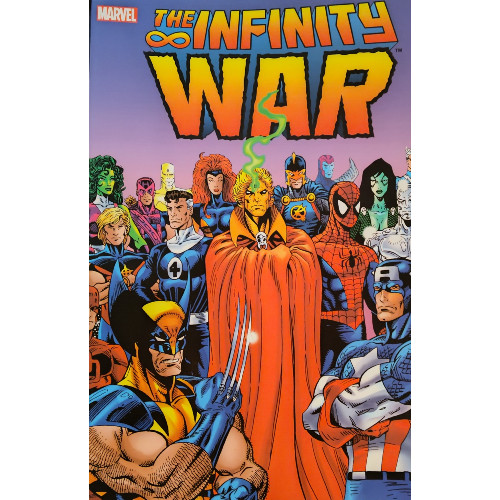
Stop me if you’ve heard this one.
Purple alien dude fights a whole mess of people, steals six colorful rocks, and with a snap of his fingers, summons the waiter of death to vaporize half of all life in the entire universe.
Sick story, right?
If you’re not familiar with Jim Starlin’s Infinity Gauntlet limited series, you’ve probably heard of its cinematic equivalent: Infinity War. Though the 2018 Marvel Cinematic Universe blockbuster shares a title with Starlin’s sequel series, each story is executed very differently.
I mean, okay, they both feature a purple antagonist…and the Infinity Gauntlet is an important MacGuffin in both…and they each show Thanos retired on a farm…but they’re otherwise very distinct entities, I swear!
I feel it’s nearly a guarantee to let you know that War, birthed in the wake of its older sibling, ain’t quite the cosmic conflagration it hopes to be.
Sorry if I burst any bubbles there.
The Infinity War
Writer: Jim Starlin
Pencilers: Ron Lim, Tom Raney, Angel Medina, Larry Alexander, and Shawn McManus
Inkers: Al Milgrom, Terry Austin, Keith Williams, Bob Almond, Tim Tuohy, and Shawn McManus
Colorists: Max Scheele, Ian Laughlin, Evelyn Stein, John Kalisz, Kevin Tinsley, and Sarra Mossoff
Letterers: Jack Morrelli, Ken Lopez, Janice Chiang, Michael Higgins, Steve Dutro, and Dave Sharpe
Issues: Infinity War #1-6, Marvel Comics Presents #108-111, and Warlock and the Infinity Watch #7-10
Publication Dates: April-November 1992
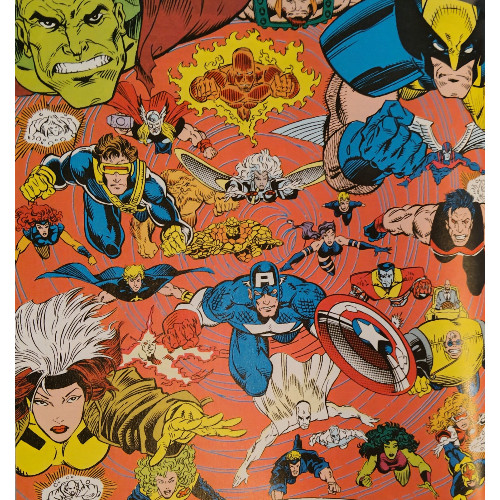
Generally, it seems to reason, if you like something once, you’ll maybe enjoy it again a second time around. That’s not a perfect strand of logic, but think of all the movies you’ve watched, songs you’ve heard, comics you’ve read, ice cream flavors you’ve sampled that you really, really liked…and how much more you liked them the second time. If you liked seeing one purple maniac track down six colorful rocks to place his stamp on the universe, wouldn’t you enjoy watching another purple maniac do the same thing?
You’d hope so. Maybe you would. Maybe you wouldn’t.
I didn’t.
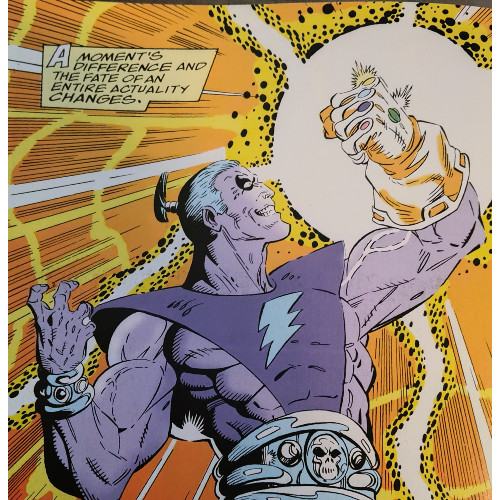
I’ve, largely, really enjoyed Starlin’s contributions to the cosmic corner of the Marvel Universe up and through Gauntlet. In building up to that famed limited series, I read through several arcs Starlin penned, examining his takes on Captain Marvel, Warlock, and the Silver Surfer. Starlin’s prowess has shown itself in other narratives I’ve recently perused, and even if I’m not as fond of his star-faring stories for DC, his work on the death of Jason Todd is iconic for a reason.
When Starlin waxes poetic appropriately, he draws the reader into a dance which plucks the mythical, the esoteric, and the deific and transforms them into something far more human and understandable. Thanos looms large in Captain Marvel and Silver Surfer simply because he’s a simp for Death, and don’t we all relate to the awkwardness of watching a guy hopelessly pine for a girl way outside his league? Haven’t we all known someone stricken with a terminal illness and witnessed the vagaries of their valiant struggles? And how heartless are you if the image of a pasty-faced clown beating a young man to death with a crowbar doesn’t bring some form of emotion to the fore?
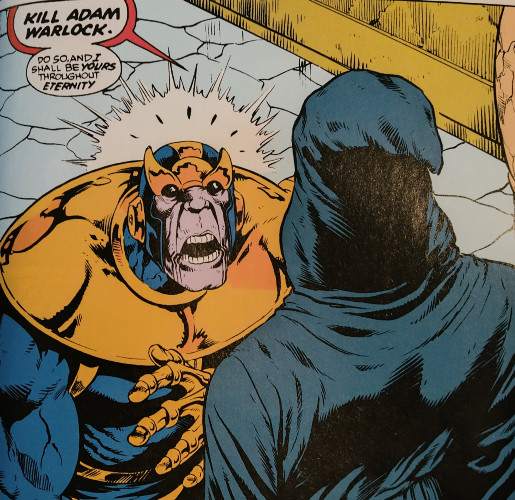
In crafting War, Starlin reaches beyond his favorite violet-hued harrower of the cosmos and draws in Warlock’s demonic doppelganger, the Magus. Once sporting a blindingly white afro, the Magus was last defeated by Warlock and seemingly erased from existence. Yet when Warlock, in the wake of Thanos' defeat, took the Gauntlet and expelled all good and evil from himself before doling out the Infinity Gems to some close friends, the evil aspect of him manifested. The Magus was reborn.
I wanted to enjoy this version of the Magus. His original incarnation is a far worthier opponent, a twisted future version of Warlock whose Universal Church has enslaved hundreds of planets. In facing him, Warlock confronts an internal evil only he can prevent, wrestling with fate itself to stave off a future he’d rather not embrace. Here, the Magus is the embodiment of Warlock’s evil urges, and though he should be a terrifying villain on the level of Thanos…he isn’t.
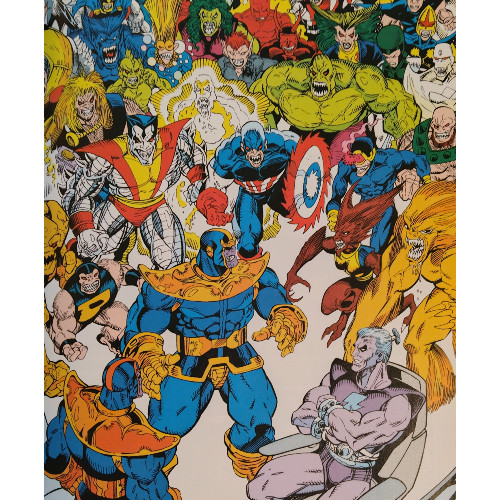
Magus lacks Thanos' motivations. He conquers and corrupts, often doing so from behind the safety of a screen. He sends out villainous clones of several heroes to face and replace them, and though these duplicates remind us Magus is merely a twisted shadow himself, the villain's unwillingness to bloody his hands, to sacrifice his very soul the way Thanos sacrificed his, keeps him from reaching the same acclaim. He sits a lot, stares a lot, ponders and pontificates a lot…but when it comes to action, he's frighteningly dull. Where Thanos' grand arc is filled with the personifications of grand, cosmic concepts–with Death herself as a powerful presence, with Thanos wresting control of the powers of life and time, among others, with the embodiment of the universe present in the ensuing conflict–Starlin’s use of similar concepts feels like a retread. An assemblage of deities feels less like a sweeping image of ultimate power and more like entities floating randomly in a lot of white space. War strives for the same depth Gauntlet achieved yet finds itself too spread out, and as a result, the compelling qualities from Gauntlet feel present but thin.
Gauntlet derives great success from its pacing–Starlin, with increasingly fantastic imagery provided by George Perez, intentionally scales up the threat of Thanos. The world is first imperiled after his "Snap!" rings across the galaxy, followed by ever-increasing stakes as the universe itself is placed into danger. There's strategic development, mounting tension matched by our heroes' efforts to combat the threat of Thanos. Very little in War feels as singularly potent–not Magus sending off twisted duplicates of our heroes, setting off a gamma bomb to decimate their heroic ranks in an instant, or imprisoning a bevy of characters with his own "Snap!" of an Infinity Gauntlet. Perhaps it's because Magus lacks the depth Starlin gave Thanos, or perhaps it's because War intentionally feels "bigger" and "louder." The scope feels forced, and much like the Magus itself, War often feels like a shade of a greater story.
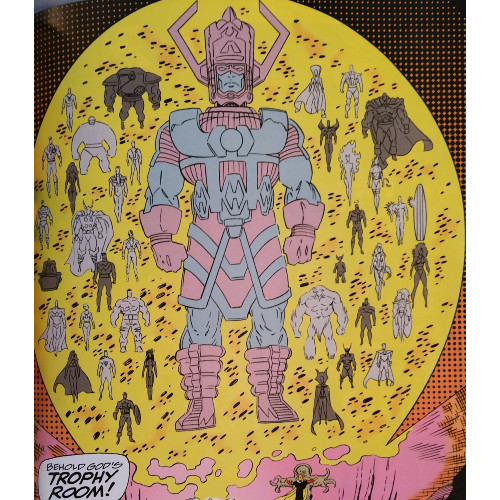
There's a purpose to Gauntlet–it's a series about Thanos. He’s the protagonist, even if he isn’t a hero. War lacks that central, all-pervasive figure. Our cluster of heroes, though larger in scale, feels less important in War than they previously did. Our villain is not nearly as simultaneously sympathetic and spiteful as Thanos. The stakes and motivations are less well defined–cosmic power is tossed about this way and that, and despite how colorful all the fireworks are, they feel narratively inconsequential.
When Starlin scales back the madness and mayhem and allows for smaller moments, that's when we get a glimpse of his real penchant for strong characterization. Quasar is given a small arc, a quest to nullify (quite literally) the Magus in one fell swoop…yet the mission may kill him, and from this, brief internal conflict arises and pushes against the grand but cold space opera Starlin calculatingly crafts. Doctor Doom and Kang the Conqueror create the oddest space cop buddy movie ever as a pair of meandering misfits, pledged to help each other defeat the Magus yet secretly harboring their own ambitions; flitting thoughts and internal insults provide comic relief as Starlin weaves them through the series. These moments are laid out nicely in between the havoc, offering brief respite from the commotion. But with a large cast and even bigger narrative ambitions, Starlin can’t quite create the saga he previously made.
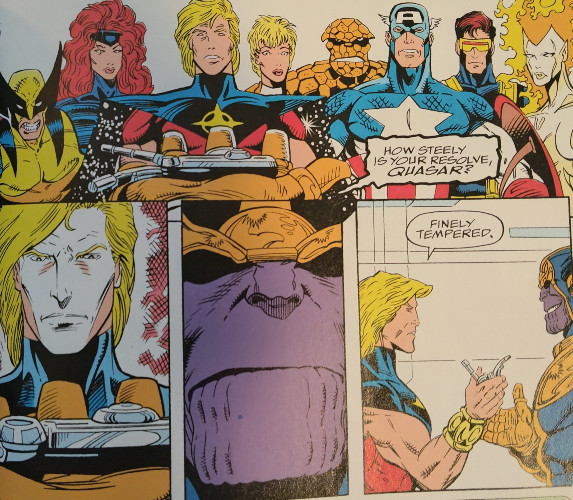
I'd like to say War was born of editorial demands. It feels like a story teased out of Starlin by his superiors, excited by the prospect of another smash hit like Gauntlet. What else am I to think of a story bigger than the first one, more bombastic than the original, but not nearly as good? War lacks the polish of its predecessor. Starlin is certainly as palpably poetic and ponderous as ever, but the writing doesn’t match the narrative. Deeper reflections on certain characters or notions of humanity and beyond are stopped short by page after page of action shots and energy beams whizzing by our heroes' heads. Too many cooks spoil the soup, they say, and I suppose the same can be said about superheroes. They’re all mashed together, and when characterization is given room to breathe, it's quickly swallowed up again.
Included in the volume I own are a few issues of Warlock and the Infinity Watch I've previously reviewed, as well as four Marvel Comics Presents issues focused on Thanos tacked onto the end. Those final four issues are the highlight of the collection, letting Starlin do what he does best: deep characterization of his best creation. This is the strongest examination of post-Gauntlet Thanos, yanked from his self-imposed retirement and soon realizing he's not as finished with Death as he originally believed. We approach Thanos at his most emotional, offered his greatest goal practically on a silver platter…yet the Gauntlet episode has left him a changed Titan, and suddenly, the once laser-focused Thanos is divided.
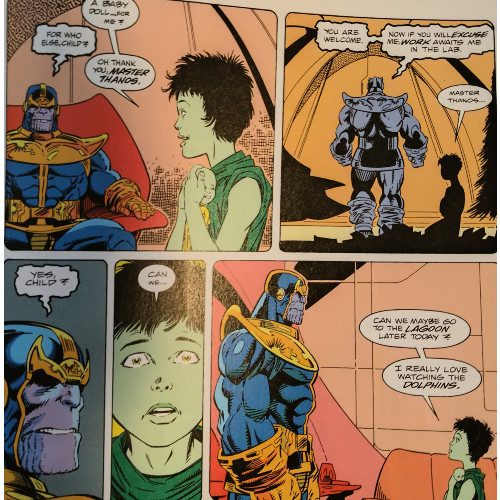
This is a Thanos whose heart is weighed more heavily than his mind, in both a three-part tale and a single narrative dedicated to his relationship with his adopted daughter Gamora. Try as he might to slip back into his analytical, cold methods of calculation, Thanos backpedals too late: we have seen him stripped of his frigid face; beneath lay embers of passion and emotion, still smoldering. The Thanos who celebrated Christmas with Gamora as a child has tried to limit any show of emotion, and in the intervening years, he's largely succeeded. Now, with his mind in turmoil after his latest defeat, yet with Death continuing to haunt his doorway, Thanos is torn: who is he meant to be? Can he return to that egotistical, calculating, driven monster he was when he became a god? Or does he want something different? Are his ambitions the same?
It's the kind of characterization which would have been welcome through the entire preceding saga. And we get it in small doses. Quasar's dramatic decision, Doom and Kang's trademark scheming, a battle between Thanos and a doppelganger where the Mad Titan literally wrestles with himself. Our friend Spidey is limited in his appearances, defeating his own twisted double off-panel (not the last we’ll see of that monstrosity, btw) before helping Hawkeye fight his own darkened duplicate. Spidey fades into the background after this, not even joining a host of heroes sent to confront the Magus…though, given his involvement in the last "Infinity" event led to him getting his brains bashed with a rock, Spidey should probably count himself lucky. But though other characters are given miniature moments to stand out during the war, Spidey does not rank among their number.
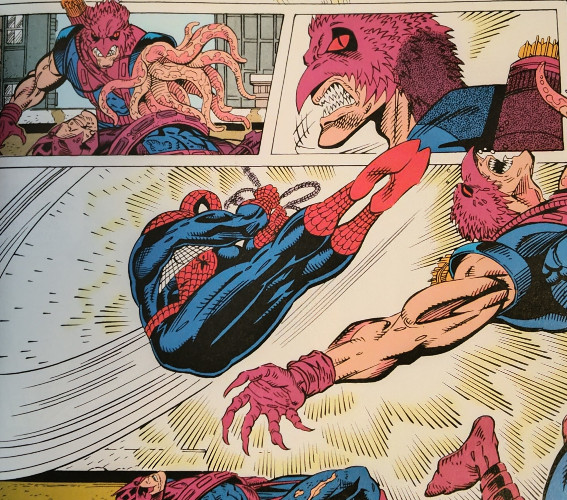
Unfortunately, so much is packed into this series, the interesting individual pieces are lost…largely saved, I assume, to tie-in issues. War possesses inflated grandeur, constructed upon the back of its older sibling, but though it tries standing taller, it teeters and topples. It’s not unlike DC’s Crisis on Infinite Earths: a mega crossover asking we keep track of a cluster of characters engaged in cosmic confrontation, knowing we cannot possibly care for every hero who flits across the page. It’s too much. Yes, we may be reading about a war, but I’d much rather have a story focused on the soldiers fighting it.